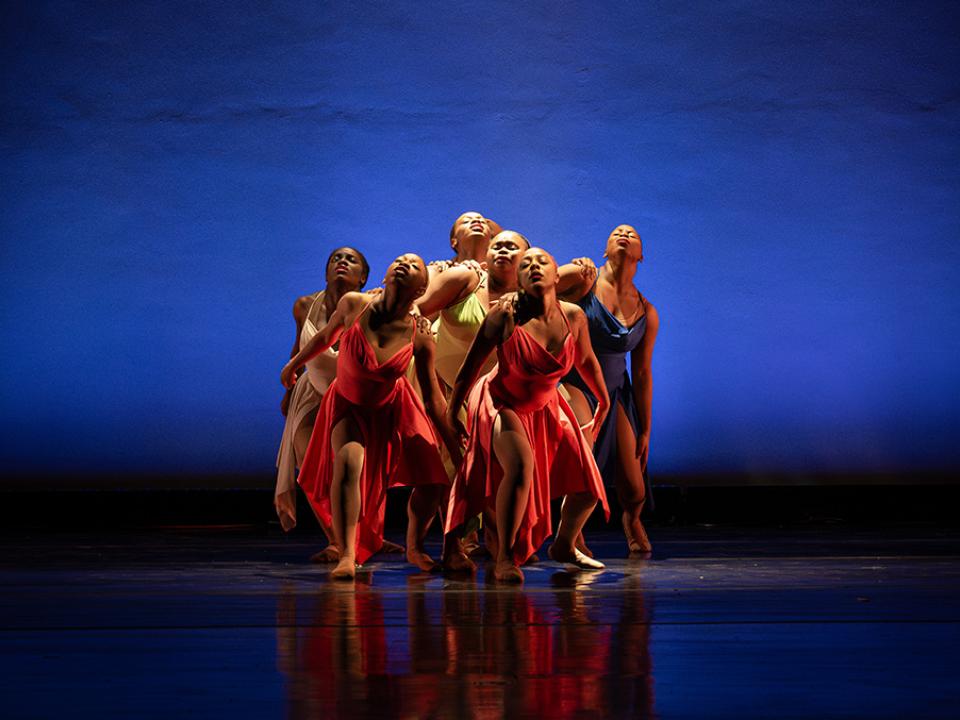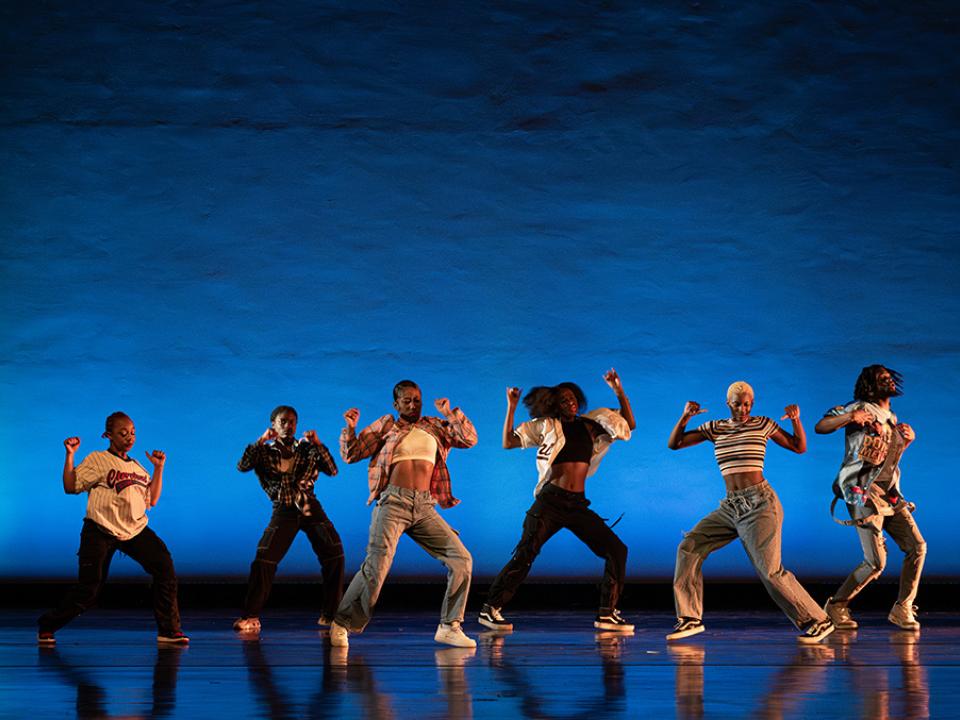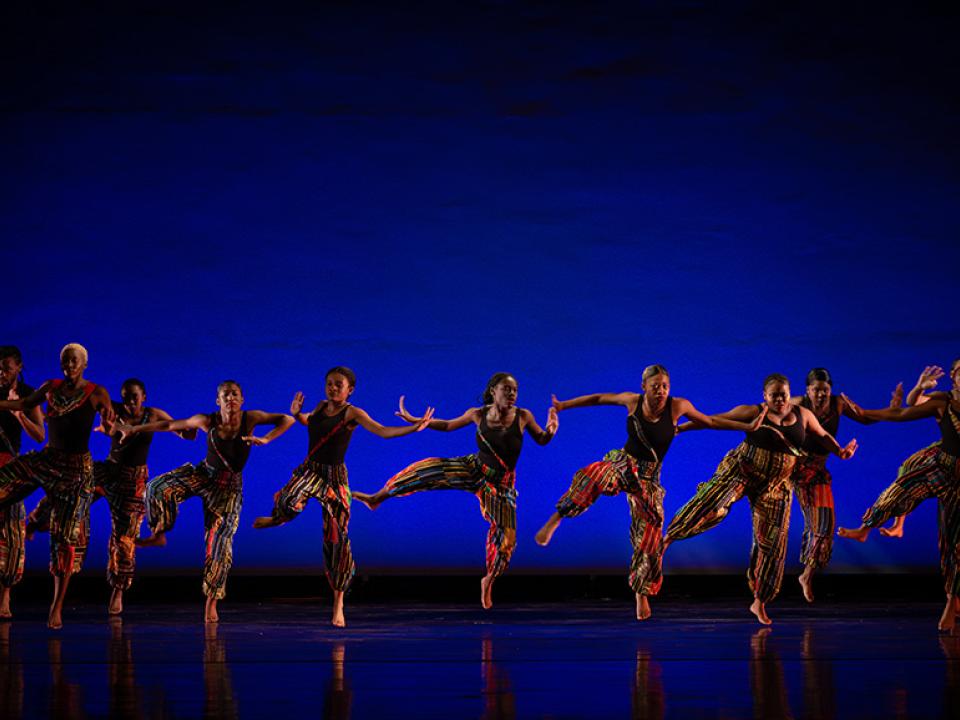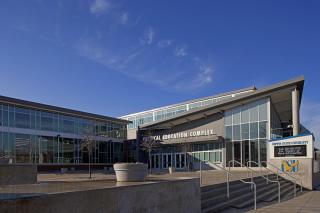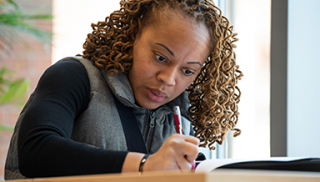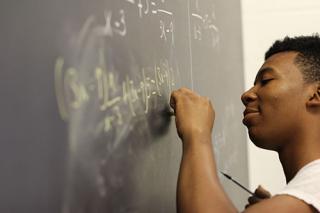Dance
Dance

Dance is so many different things. Not only an art, dance can also be a language or means of expression, a mode of inquiry, and a tool for healing. It can be an act of protest or celebration. It can be a method to honor, recognize, engage, and transform cultural traditions. Dance in an interdisciplinary medium that offers opportunities to learn skills that translate into other fields and industries.
Embodied skills that so many employers look for can be found in the study of dance. Dancers are skilled at body awareness which can translate to strong communication and interpersonal skills. Dance is a multilayered field where artists dance, write, make films, dance in specific sites, collaborate with others, and engage their communities. Choreographers must think critically and creatively about the interplay of dancers’ bodies, music, and movements that come together to make something beautiful or thought-provoking. Dance artists are also scholars who work between social praxis and their communities to promote and engage new work. Dance artists are important innovators of new modes of making dance performance through collaboration.
The dance program at Coppin provides dancers with a culturally diverse training program that celebrates and promotes contributions of marginalized artists of color to mainstream arts communities. We maintain an important focus on African, African American, and Caribbean forms, as well as choreographic practices, production, dance studies, and somatics. Our balanced program, asks students to contemplate and reflect on their experiences and praxis in the context of professional global contemporary dance work.
You can choose to major or minor in Dance.
Dance to a Different Beat
Approved as a program in 2009 by the University System of Maryland (USM), the Dance major focuses on technical, cultural and performance education. Our students look at the art form through a critical and creative lens in ways that prepare them for real life dance experiences. We also focus on expanding our students' understanding of dance as an art form, engaged practices, mode of healing, and as areas of interdisciplinary research and creation.
Faculty support students academically and professionally, and encourage conversation around professional opportunities in dance education, performance, and choreography. We also encourage our students to pave their own paths and study a complementary field like English, History, Drama, Urban Arts, Black Studies, Film, Global Studies, Political Science, Marketing, Arts Administration, Education, or Technology. The possibilities for interdisciplinary work are encouraged in our Liberal Arts Dance Program.
The Program organizes masterclasses, workshops and performance opportunities, both on and off campus.

750+ Course Options
The Coppin State University Academic Catalog has a wide variety of skill-building courses designed to inspire and prepare you to be in-demand professionals and transformational leaders.
Incoming Dance Major Requirements
Welcome to Coppin Dance! We are excited to welcome you into a program committed to preparing you for a career in dance. Here’s what every hopeful student must know before officially declaring as a dance major:
- Incoming dance majors and minors should contact the Dance Coordinator immediately upon entering the University for a movement placement audition. This audition is required prior to registering for courses.
- Dance majors must register for dance technique courses immediately after declaring as a dance major.
- All dance majors must complete all major courses with a grade of C or higher.
- Dance majors with prior movement training (i.e. dance, gymnastics, etc.) may register for 200+ level movement technique courses. Upper-level movement technique courses require a registration permission code. Contact the Dance Coordinator for more information.
- Dance majors must also complete DANC 226 Introduction to Choreography with a grade of C or higher.
Undergraduate Courses and Program Requirements
The Dance program offers a Bachelor of Science degree requiring 120 credits for graduation. We structure classes to be relatively small so dance faculty can work closely with each student. Our broad range of movement courses include African Dance, Caribbean Dance, ballet, jazz, hip hop, yoga, somatic, and contemporary dance. Our well-rounded program engages students in dance studies, improvisation, choreographic practices, production, and opportunities to present dance work.
To graduate with a Bachelor of Science in Dance, you must complete 120 credit hours. These credit hours split among:
General Education Requirements, or GERs
Required Theory courses
Core Movement Technique courses
Dance Performance courses
Professional Development and Internship courses
Required Theory Courses (12 credits)
All dance majors must complete DANC 325 and an additional 9 credits from the following courses:
| Course | credits | Name |
|---|---|---|
| DANC 130 | 3 | Dance Education |
| DANC 200 | 3 | Dance as Art and Culture |
| DANC 325 | 3 | Dance History-Dance Studies |
| DANC 327 | 3 | Movement Analysis |
| DANC 328 | 3 | Creative Process: Theory and Practice |
Core Movement Techniques Courses (33 credits)
Dance majors must complete 33 dance technique credits. At least 15 credits of these credits must be completed at the 300 or 400 level. Students can petition for faculty approval to register for courses aligned with prior training or level of proficiency. Students may repeat these courses for credits toward graduation up to a maximum.
| Course | credits | Name |
|---|---|---|
| DANC 101 | 2 | Pilates I |
| DANC 102 | 3 | Vinyasa Yoga |
| DANC 116 | 2 | Cultural Rhythms I |
| DANC 118 | 2 | Improvisation |
| DANC 119 | 2 | Urban Contemporary Dance |
| DANC 120 | 2 | Ballet Fundamentals I |
| DANC 121 | 2 | Modern Dance Fundamentals |
| DANC 131 | 2 | Authentic Movement |
| DANC 220 | 2 | Ballet Fundamentals II |
| DANC 221 | 2 | Modern Fundamentals II |
| DANC 227 | 3 | Sacred Modern Dance I |
| DANC 228 | 3 | Musical Theater and Jazz Dance |
| DANC 235 | 3 | African Dance I |
| DANC 236 | 3 | African Dance II |
| DANC 320 | 3 | Intermediate Ballet I |
| DANC 321 | 3 | Intermediate Modern Dance I |
| DANC 324 | 3 | Tap Dance |
| DANC 440 | 3 | Advance Ballet I |
| DANC 441 | 3 | Advanced Modern Dance I |
Dance Performance Courses (9 credits)
Any student, including majors and non-majors, taking a dance performance course must also register to take at least one dance technique course at the same time.
All dance majors must complete the following courses to satisfy dance performance course requirements:
DANC 425 (Professional Outreach Workshop) or DANC 426 (Dance Production)
and
4 credits of 300-400 Dance Company courses from this list or through substitution as determined with your advisor:
| Course | credits | Name |
|---|---|---|
| DANC 122 | 1 | Dance Company I |
| DANC 123 | 1 | Dance Company II |
| DANC 222 | 1 | Dance Company III |
| DANC 223 | 1 | Dance Company IV |
| DANC 322 | 1 | Dance Company V |
| DANC 323 | 1 | Dance Company VI |
| DANC 422 | 1 | Dance Company VII |
| DANC 423 | 1 | Dance Company VIII |
Students may repeat Dance Company courses for credits toward graduation up to a maximum.
Professional Development and Internship Courses (6 credits)
All dance majors must complete these courses:
| Course | credits | Name |
|---|---|---|
| DANC 329 | 3 | Professional Outreach |
| DANC 427 | 3 | Dance Internship |
Remember! You must complete all major and prerequisite courses with a grade of C or higher.
Repeat Course Policy for Dance Majors
As a dance major, you may repeat movement technique and dance company courses. You may be able to apply repeated major coursework toward graduation in accordance with our departmental policy:
- 1 credit courses may be repeated for up to 3 credits towards graduation
- 2 credit courses may be repeated for up to 6 credits toward graduation
- 3 credit courses may be repeated for up to 9 credits toward graduation
Dance majors can meet upper level course requirements by repeating the following courses in accordance with departmental policy:
- DANC 320
- DANC 321
- DANC 322
- DANC 323
- DANC 325
- DANC 328
- DANC 329
- DANC 420
- DANC 421
- DANC 422
- DANC 423
- DANC 427
- DANC 440
- DNC 441
- DANC 499
- All core movement technique classes
- All performance courses
- All theory courses
Sample Degree Plan
Be sure to connect with your academic advisor to plan your semester courses. The plan below is just an example—your journey may have different requirements.
Fall Semester (15 credits)
| Course | credits | name |
|---|---|---|
| ENGL 101 | 3 | English Composition I |
| BIOL 101 | 4 | Biological Sciences |
| FRSEM 101 | 1 | Freshman Seminar |
| DANC 226 | 3 | Introduction to Choreography |
| DANC 100-200 | 2 | Movement Technique |
| DANC 100-200 | 1 | Dance Company |
| DANC 499 | 1 | Special Topics |
Spring Semester (15 credits)
| course | credits | name |
|---|---|---|
| ENGL 102 | 3 | English Composition II |
| PHSC 103 | 3 | Physical Science |
| MATH | 3 | Math Requirement |
| DANC 100-200 | 2 | Movement Technique |
| DANC | 1 | Dance Company |
| MISY 150 | 3 | Tech Fluency |
Fall Semester (15 credits)
| Course | credits | name |
|---|---|---|
| ECON 103 | 3 | Intro to Business/Entrepreneurial |
| ART 103 | 3 | Basic Design |
| DANC 205 | 3 | |
| DANC 499 | 1 | Special Topics |
| DANC 200-300 | 2 | Movement Technique |
| DANC 200-300 | 2 | Movement Technique |
| DANC | 1 | Dance Company |
Spring Semester (15 credits)
| Course | credits | name |
|---|---|---|
| WLIT 207 | 3 | World Literature |
| THEA 211 | 3 | Acting for Non-Majors |
| DANC 200 | 3 | Dance as Art and Culture |
| DANC 200-300 | 2 | Movement Technique |
| DANC 200-300 | 3 | Movement Technique |
| DANC | 1 | Dance Company |
Fall Semester (15 credits)
| Course | credits | name |
|---|---|---|
| ANTH 207 | 3 | Cultural Anthropology |
| DANC 325 | 3 | Dance History |
| DANC 300-400 | 2 | Movement Technique |
| DANC 300-400 | 3 | Movement Technique |
| DANC | 1 | Dance Company |
| DANC | 3 | University Elective |
Spring Semester (15 credits)
| course | credits | name |
|---|---|---|
| DANC 327 | 3 | Movement Analysis |
| DANC 328 | 3 | Creative Process |
| DANC 300-400 | 3 | Movement Technique |
| DANC 300-400 | 3 | Movement Technique |
| DANC | 1 | Dance Company |
| DANC | 2 | Dance Elective |
Fall Semester (15 credits)
| Course | credits | name |
|---|---|---|
| DANC 329 | 3 | Professional Outreach |
| DANC 300-400 | 3 | Movement Technique |
| DANC 300-400 | 3 | Movement Technique |
| DANC 300-400 | 1 | Dance Company |
| DANC xxx | 2 | Dance Elective |
| XXXX xxx | 3 | University Elective |
Spring Semester (15 credits)
| Course | credits | Name |
|---|---|---|
| DANC 426 | 3 | Dance Production |
| DANC 427 | 3 | Internship |
| DANC | 3 | University Elective |
| XXXX xxx | 3 | University Elective |
| XXXX xxx | 3 | University Elective |
Dance lives in the Department of Humanities in the School of Arts & Sciences within the College of Arts & Sciences, and Education.
